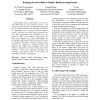Free Online Productivity Tools
i2Speak
i2Symbol
i2OCR
iTex2Img
iWeb2Print
iWeb2Shot
i2Type
iPdf2Split
iPdf2Merge
i2Bopomofo
i2Arabic
i2Style
i2Image
i2PDF
iLatex2Rtf
Sci2ools
SERP
2004
2004
Keeping Secrets within a Family: Rediscovering Parnas
David Parnas wrote several papers in the 1970's and 1980's that are now considered classics. The concepts he advocated such as information hiding and bstract interfaces are generally accepted as the appropriate way to design nontrivial software systems. However, not all of what he proposed has been fully appreciated and assimilated into our practices. Many of his simple, elegant ideas have been lost amongst the hype surrounding the technologies and methods that have arisen in the past two decades. This paper examines Parnas's ideas, especially his emphasis on program families, and proposes that college-level computing science and software engineering curricula should renew their attention to these very important principles and techniques and present them in the context of contemporary software development.
| Added | 31 Oct 2010 |
| Updated | 31 Oct 2010 |
| Type | Conference |
| Year | 2004 |
| Where | SERP |
| Authors | H. Conrad Cunningham, Cuihua Zhang, Yi Liu |
Comments (0)

